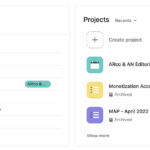Starting an online business is an exciting journey, but it can also fall apart FAST if you don’t start with systems that scale. As a start-up, establishing a solid plan for ensuring your business grows and scales effectively = critical.
Table of Contents
ToggleSystems that scale
Whether you sell e-commerce, digital courses, printables, coaching, services or memberships…the right systems make or break your business when it comes to scaling.
In this article, we’ll explore the best systems you can implement to help grow your online business from a start-up to a scale-up. From marketing, to customer relationships to project management, we’ll cover everything you need to know. Streamline your operations, boost your productivity, and drive results.
So, if you’re ready to take your online business to the next level, let’s dive in!
Think you’re ready to start scaling from full time to $20k months and beyond?
Understanding the importance of systems in business growth
In any business, systems are the key to achieving success while maintaining quality of life (seriously!) Systems help streamline operations, automate repetitive tasks, and focus on what matters most. (Growing your business.)
In the online world, systems are even more critical than with traditional businesses because of the potential for volume. With so many different channels and platforms to manage, it’s easy to become blind to what’s actually happening in your business. That’s why having the right systems in place from the beginning is helpful to make sure you CAN scale when the time comes.
Productivity
One of the most significant benefits of systems is that they allow you to be more productive. When you have a system for everything, you can work more efficiently and get more done in less time. Systems also help you stay organized, which is crucial when you’re running an online business. With so many different tasks to manage, it’s easy to forget things or lose track of what you’re working on. Systems help you stay on top of everything, so you can focus on growing your business.
Decision Making and Focus
Another benefit of systems is that they help you make better decisions. When you have data and information at your fingertips, you can make informed decisions that are based on facts, not guesswork.
I know this sounds like a basic fundamental piece of advice, but think about it. If you get a passive course sale online, do you know where it came from? Did it come from your email list, social media, or an affiliate partner? Was it because you were on a podcast, or because of your blog post, or maybe an event you spoke at? If you don’t know where the sale came from, you don’t know what you can do MORE of or LESS of to get results.
For example: one of my clients was posting and engaging daily on Instagram, but it drained the life out of her. When we looked at her data, it seemed like most of her sales came from email. Email = is easy for her. So, for the next launch we focused on email alone (no social). And guess what? She met her sales goal. This is going to be a huge time saver in the future., because ALL of her sales effort can go into email. And ALL of her marketing effort can go into growing her email list.
Systems also help you identify areas where you need to improve, so you can make changes and optimize what you’re doing.
There are 5 systems you need for multiple 6-figures and beyond:
- Mindset
- Marketing
- Sales
- Experience
- Resilience
#1: Mindset
I know you didn’t come to this post for this, but you will struggle to find ease in entrepreneurship if you don’t first work on your mindset.
This is your BIGGEST bottleneck before $20,000 months. I have a heck-ton of posts on mindset, so I’ll just leave you with this…
Go here to start learning about mindset.
#2: Marketing
The next systems you’ll need revolve around marketing.
Lead generation systems for start-ups
One of the most crucial systems for any start-up is a lead generation system. Without leads, you don’t have customers, and without customers, you don’t have a business.
A lead generation system helps you attract and convert potential customers into paying customers. There are several different lead generation systems you can implement. The type of lead generation you do depends on 1) the stage of your business, 2) the type of business you have and 3) what’s aligned with your personality and preferences.
Lead Generation: Startup Phase, Hunting
In the startup phase of your business, you have to do more “hunting” versus “gardening” for short term sales. Hunting refers to proactively seeking out new business. Gardening refers to the automated ways you’ll generate leads as your business and your income grows.
If you’re a service provider or a coach, this means actively prospecting for new potential customers. This can be online, or in person at events. But the idea is that you are intentionally seeking out new business and making new contacts.
If you’re a content creator, this means using platforms that have short term potential in addition to your long term, passive traffic sources. For example, using a Facebook group to help nurture leads while you grow your email list passively with blog traffic. Or using Instagram, Facebook or Linkedin to do social selling (intentionally reaching out to prospects via social media) to help generate visibility for what you want to sell through the blog.
These are just two examples, but the point is this… In the beginning stages of your business, you’ll generate revenue faster if you take proactive action to get sales.
Enjoying this article? Here’s another you should check out: more money, less hustle.
The SYSTEM for proactive sales is up to you, but it will (probably) involve:
- Choosing a platform to leverage for short term sales (social media, in person events, etc.)
- Choosing a method for outreach
- Creating loose scripts for your outreach process (I say “loose” because prospects are people, not templates, right? So we should engage with them genuinely, always)
- Deciding daily or weekly goals for your proactive lead generation process
- Creating an SOP (standard operating procedure) for the way you do your outreach, in case you eventually want to delegate it
Lead Generation: Startup Phase, Gardening
While you are deciding on a system for short term sales, I recommend also creating a system that will help generate inbound leads over time. Here are some possible systems, which is not at all an exhaustive list.
Search engine optimization (SEO)
SEO is the process of optimizing your website to rank higher in search engine results pages (SERPs). When your website ranks higher, you’ll attract more traffic, and more traffic means more potential leads. SEO is a long-term strategy, but it can be incredibly effective if done correctly.
Go here to read more about SEO for beginners.
Pay-per-click advertising (PPC)
PPC advertising allows you to place ads on search engines and social media platforms. You only pay when someone clicks on your ad, which means you’re only paying for potential leads. PPC advertising can be expensive, but it can be an effective way to generate leads quickly.
Content marketing
Content marketing involves creating valuable and informative content that attracts potential customers. When you provide value to your audience, they’re more likely to trust you and want to do business with you. Content marketing can include blog posts, videos, social media posts, and more.
Here is a post about getting coaching clients through SEO.
Here is a post about monetizing blogs in general.
Social media marketing
Social media marketing involves using social media platforms to promote your business and attract visibility. You can use platforms like Facebook, Instagram, Twitter, and LinkedIn to reach your target audience and generate leads.
My favorite for long term lead generation is a Facebook group, because it’s easier to nurture people in a genuine way over a long period of time.
I haven’t had personal luck with Twitter, but I haven’t tried that hard and I know some people do VERY well there. Linkedin is also a great place for long term nurture because messaging tends to be very welcome. Instagram is popular, but because posts have such a short shelf life for visibility, it’s not at the top of my list.
#3: Sales
The next set of systems you’ll need revolve around sales.
Nurturing systems to convert leads into customers
Generating leads is only half the battle. The next step is to convert those leads into paying customers. Nurturing systems help you build relationships with your leads and guide them through the buying process. There are several different nurturing systems you can implement to convert leads, including:
1. Email
Email marketing involves sending emails to your leads to keep them engaged and interested.
You can use email marketing to provide valuable content, promote your products or services, and encourage your leads to take action.
2. Retargeting
Retargeting involves showing ads to people who have already interacted with your business in some way. For example, if someone visited your website but didn’t make a purchase, you can show them ads to remind them of your business and encourage them to come back.
Because this is a paid form of reaching people, I would use this as an advanced strategy once you exhaust your organic options, and once you’re already doing other paid ads.
3. Free Offers / Lead magnets
Lead magnets are free resources that you offer to your leads in exchange for their contact information. Freebies can include things like ebooks, whitepapers, checklists, and more. By offering something of value, you bribe leads to join your email list, and start building relationships with them.
4. Training Events
Events are live or pre-recorded presentations that provide valuable information to your leads. Webinars, masterclasses and workshops can be an effective way to build trust with your audience and demonstrate your expertise in your industry.
My favorites are workshops because they feel the most authentic.
Project management and collaboration systems for scaling teams
As your online business grows, you’ll need to manage more projects and collaborate with more team members. That’s where project management and collaboration systems come in. These systems help you manage your projects and collaborate with your team effectively. There are several different project management and collaboration systems you can implement.
Here’s teo project management tools I personally use:
Asana is a popular project management system that allows you to manage your projects and collaborate with your team in one place. Asana is the tool I personally use, and I’m obsessed with it. Asana offers features like task management, project timelines, and more.
Here are a couple screenshots that show a monthly project we duplicate, and a snippet of what the home screen looks like:
Slack is a messaging and collaboration system that allows you to communicate with your team in real-time. It offers features like chat rooms, direct messaging, file sharing, and more. I think Asana and Slack work really well together if you’re working with teams who need to communicate on projects. Slack is also great for creating a sense of community.
I use it for my mastermind coaching clients to private message between coaching calls, and also communicate as a group between calls. We collaborate, commiserate, and I provide coaching via messenger. Here’s a quick screenshot of our main chat channel, and you can see the other channels I created for the group on the left:

By implementing project management and collaboration system s that scale, you can manage your projects and collaborate with your team effectively. But as your business grows, you’ll also need to manage your finances.
Accounting and finance systems for managing finances
Managing your finances is critical to the success of your online business. You need to know how much money you’re making, how much you’re spending, and where your money is going. Accounting and finance systems help you manage your finances effectively.
Hiring an accountant (my recommendation)
Personally, I think it’s worth hiring someone to do accounting. My accountant (Kickstart accounting) is FABULOUS and costs about $200 monthly. (Give or take depending on how often you want reporting.)
Hiring someone to send me monthly reporting on my finances was SUCH a weight off. Not only that, but they know exactly what my tax preparer needs, so it literally takes me 20 minutes to do my taxes. (Well, actually longer but only because I have to wrangle up my husband every year and he doesn’t have an accountant. Ask him why not me!)
DIY (cheaper to start if you don’t want to pay)
There are several different accounting and finance systems you can implement. I’ve used Google sheets in the past, but haven’t personally used any software so I won’t chime in here. I would simply do a Google search, and look for reviews you’re happy with.
Marketing automation systems for maximizing marketing efforts
Marketing is critical to the success of your online business. You need to promote your business, attract new customers, and keep your existing customers engaged. Marketing automation systems help you do all of this and more.
The Basics of Automated Marketing
Most of you reading this don’t need a formal CRM (customer relationship management tool). A formal CRM will be expensive, but will also track nitty gritty details of your customer journey. If you know for sure you’re aiming for 7-figures and beyond in your business, and that your business will involve clients (like coaching or services), then you’ll probably want a CRM.
That said, most of you reading this just need some simple systems and automations.
Basic marketing automation includes:
- A free offer, also called a lead magnet, is a cornerstone of most online business models. It’s how you grow your email list
- After your free offer, people need to get on your email list and receive at least a couple automated emails to welcome and nurture them
- After the nurture, you want to sell something or continue relationship building to eventually sell something
^^^ That is the absolute minimum viable for “automated marketing”. The next steps include:
- Segmenting and tagging contacts based on their behavior, so you can target them more specifically without pestering people who aren’t engaging
- Considering making multiple offers over time. How can your products work together to increase the value of each customer?
- And so much more. But these are foundations
Think you’re ready to start scaling from full time to $20k months and beyond?
#4: Experience
The next set of systems you need for scaling revolve around your customers’ experiences.
Customer service and support systems for improving customer satisfaction
Experience is a system in business a lot of people don’t think about. We kind of stop after “getting the sale”. But providing excellent customer service and and delighting buyers is critical to your long term success.
Initially, you’ll probably manage customer support through your email inbox.
As you scale, you need to delegate this to someone on your team. It’s possible you can stay on top of it through email alone, but you may want to incorporate a project management tool to delegate tasks to team members. (For example, Asana and the other tools mentioned above).
Customer Service Tools
If you plan to have an extremely high volume for customer service, you’ll probably want an actual ticketing system. This helps you and your future team make sure that nothing falls through the cracks. Here are some popular examples I recommend.
I use Asana and email for my customer service. If you need a robust tool, I would do a quick Google search.
By implementing a customer service and support system, you can improve customer satisfaction and ensure your customers are happy with your business. But with so many different systems to choose from, how do you know which ones are right for your business?
Epic Businesses Should Use a CRM
There are several different marketing automation systems you can implement if you’re planning for high volume of customers. The email marketing tool I use (ActiveCampaign) has a CRM component at the highest tier. I don’t personally use a CRM so I won’t chime in with some of the larger solutions. When I was in corporate, we used an outdated tool that is no longer available.
#5: Resilience
The last set of systems you need for scaling deal with building resilience. Expect more to come about this in future posts, but here are some resources for you.
- Trauma effects on mindset
- How to become an embodied entrepreneur
- Holistic approach to mindset
- Regulate your nervous system to cope with stress
- How to use your business to manifest abundance
- Somatic healing for entrepreneurs
Conclusion: How systems that scale can help you grow your online business
Systems that scale are critical to the success of any online business. With the right systems in place, you can streamline your operations, automate repetitive tasks, and focus on growing your business.
From lead generation systems to customer service and support systems, there are many different systems you can implement to help grow your online business. By choosing the right systems for your business, you can ensure your online business grows and scales effectively. So, start implementing systems today and take your online business to the next level!
Apply for a Scale Audit
Think you’re ready to start scaling from full time to $20k months and beyond?
Free: Mindful Marketing Newsletter
Join 6,500 others on our newsletter.



